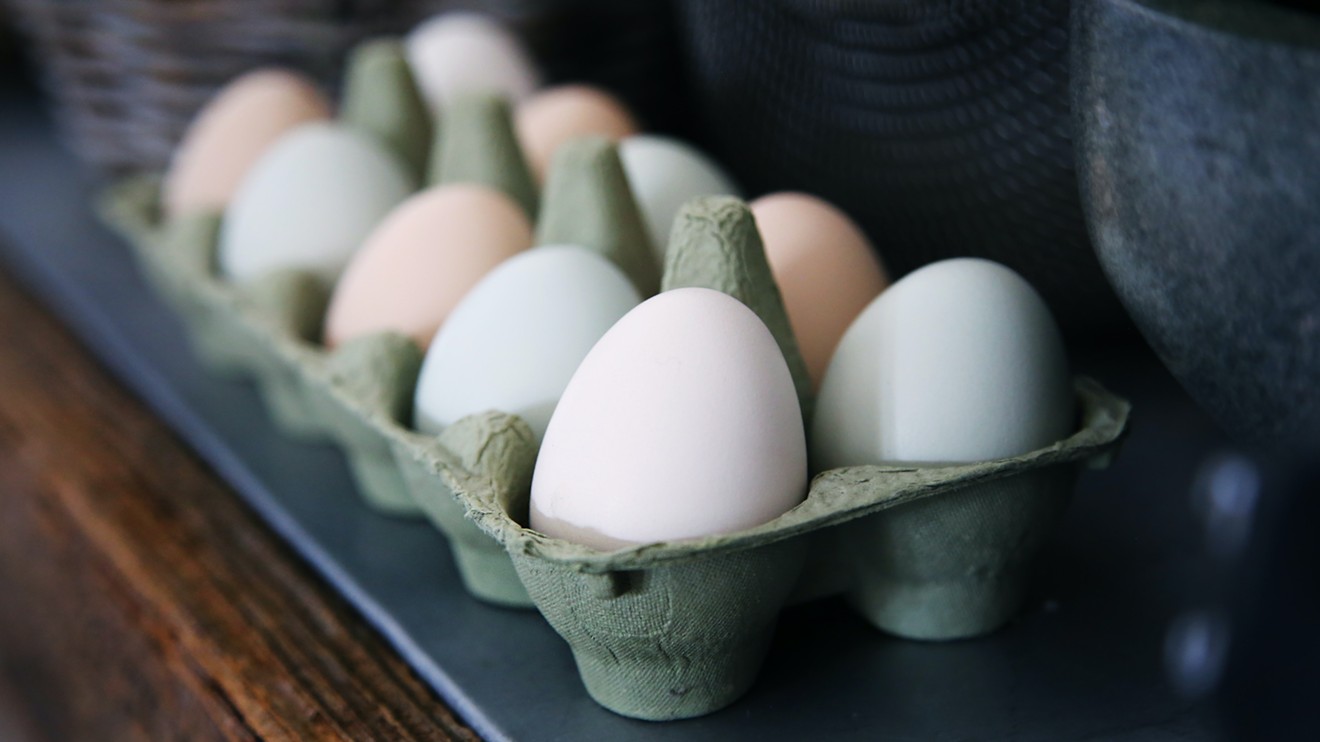In Miami, grocery stores have seen a big rise in demand for eggs and are trying hard to keep their shelves stocked.
"We've been completely out of eggs on some days. It's calmed down a little bit now, but in the last weeks, it was madness," says Michael Milam, an executive at Milam's Markets, a family-owned, Miami-based grocery chain.
The same demand has been seen at Sedano's, another local grocery chain. The company has faced criticism on social media after photos began circulating of 30-count cartons of eggs selling for as much as $12.19.
"Extraordinary demand has caused an egg shortage in the entire country, resulting in a cost increase," the company explained in a tweet defending its prices.
Like their sanitary-tissue counterpart, eggs are seemingly in short supply because of a panic-buying mentality. People are afraid they won't be able to buy eggs later, so they think they have to buy a ton of them now. But egg suppliers think there's more to it than that rationale.
"I believe people are home, so they're cooking more and they're baking. They also have kids at home, so they're trying to teach kids how to bake to stay busy," says Dale Volkert, owner of Lake Meadow Naturals, an egg and chicken wholesale farm in Central Florida.
Economists from the American Farm Bureau Federation say those changes in consumer behavior have caused temporary shortages. NPR reported in mid-March that stores have seen a shortage of high-demand staples such as milk and eggs as producers and distributors try to keep up with Thanksgiving-like levels of demand.
Nationally, the price for a dozen large white eggs soared to $1.32 this month, up from $1.03 in late March. Cage-free eggs hit a high of $3.09 at the beginning of April, up from $2.57 in late March. In the past week, prices have simmered down as shoppers become more confident about availability and stores are better able to keep eggs in stock, according to the U.S. Department of Agriculture.
Wholesalers such as Lake Meadow Naturals are getting a little help staying afloat from the Florida Department of Agriculture and Consumer Services. Last week, Agriculture Commissioner Nikki Fried signed an emergency order relaxing the labeling requirements for commercially sold eggs.My Shipt girl just sent me the egg situation at Publix I’ll eat eggs in 2045. pic.twitter.com/GrUHNTfzq4
— Annie (@AnnieAreUOhK) March 28, 2020
Normally, when eggs are sold to retailers, they're packaged in cartons of 12 or 18 and are required to include labeling saying where they came from, who's responsible for them, and how to cook them to prevent exposure to salmonella. Restaurants, however, buy them in large 30-egg flats with far less labeling.
Under the new order, retailers can now buy egg flats from restaurants and wholesalers and then attach a placard with all of the safety information instead of labeling every carton. A spokesperson for the state agriculture department tells New Times the measure is meant to allow restaurants to sell their egg inventories and to boost the availability of eggs.
Over at Lake Meadow Naturals, the change in policy has allowed the company to sell larger orders to retailers instead of restaurants, which have had less demand for eggs because of dining room closures. Though it meant a bit of restructuring, Volkert has been able to shift his business to almost primarily sell to local organic markets in South Florida, including Delaware Chicken Farm & Seafood Market in Hollywood and Harpke Family Farm in Dania Beach.
"A few places have taken our eggs in loose flats during this crisis, and the labeling rule did help," Volkert says.
But what about people who can't make it to the market or afford the expensive eggs remaining on grocery store shelves? Amid the shortage, some civilian chicken owners have hatched plans to supply eggs for themselves and their neighbors.
Kim Kortenbach lives in Miami Springs and cares for three hens — Hazel, Marilyn, and Little Bit — in her backyard. She's had chickens for over ten years and has always eaten eggs laid at home.
"If you look at my Facebook, I post a lot of pictures of food, and a lot of it is egg-based. We eat a lot of eggs in my house," says Kortenbach, whose birds lay about 18 eggs a week.
Amanda Malmborg, a resident of DeLand, a city about an hour north of Orlando, has 19 hens in her yard, and her porch has become a one-stop shop for her neighbors to pick up eggs during the coronavirus crisis.
"We get a dozen eggs a day, easy, and we're not big egg eaters," Malmborg says. "I leave a gift bag with a couple dozen eggs in cartons on the front porch for people to take."
Malmborg says neighbors who've stopped by for eggs have left her gifts in return, including beer and baked goods. It's a system that has fostered a sense of community at a time when in-person contact is restricted.
"Normally I'd invite them in," she tells New Times, "but we're social distancing."











